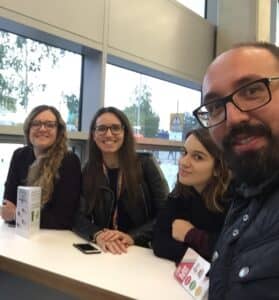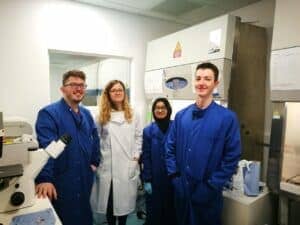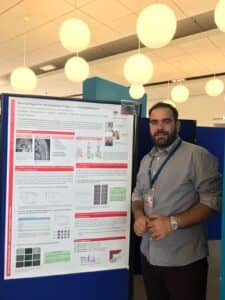JOSH'S STORY
In February of 2021, Josh’s parents noticed he was getting very pale. What was originally thought to...
Read MoreWe are very excited that Kidscan-funded research into new treatment for children’s cancer, has been published in Scientific Reports, from the Nature group.
“Although Medulloblastoma is one of the most common brain cancers in children, treatments are still only effective in curing 70% of patients with this disease. The results from these researchers show an exciting, and new, potential application of the drug Dinaciclib for the treatment of high-risk Medulloblastoma patients. It’s also wonderful to see the contribution made to this important piece of research by Kidscan Placement Students and Kidscan Sponsored PhD students, working at the University of Salford.” Dave Pye, Kidscan Scientific Director.

Gianpiero Di Leva with team members l-r: Marta Buzzetti PhD, Sonia Morlando 3rd Year PhD both at Salford University
One of the authors of the research, Gianpiero Di Leva at Keele University, takes up the story:
“Over the last few years, my laboratory has been sponsored by Kidscan to conduct research on Medulloblastoma and chemotherapy. Our recent story on the preclinical use of dinaciclib for the treatment of medulloblastoma cells has been accepted for publication in the Scientific Reports.”
“We are focusing our research efforts on the identification of new therapeutic vulnerabilities of a paediatric cancer that is named medulloblastoma (MB). This cancer is the most common aggressive brain tumour in children and it develops in the cerebellum, the part of the brain that coordinates and regulates all muscular activities. It is a very heterogeneous disease and some patients, that are identified as Group 3 medulloblastoma, have a very poor prognosis. “

Chris Shield, Ammara Mehmood and Taron Langford, placement students with Marta Buzzetti, PhD.
Survival rates are up from 66% in 1997-2001, but despite this progress in the treatment of MB patients, there is still an urgent need of complementary or alternative therapeutic options for MB children.
“All medulloblastoma patients receive very aggressive treatments that cause far too many side effects, compromising the quality of life of these children. With the idea to identify new therapies that are more effective and able to limit the side effects of the current therapeutic regimens, we have studied a class of proteins that is called cyclin dependent kinases, known as CDKs. They regulate the division of all cells and they are altered in cancer including medulloblastoma.”
“We found that a small molecule called dinaciclib inhibits the activity of multiple CDKs in medulloblastoma and it is extremely effective in killing the Group 3 medulloblastoma cells. This opens the possibility to use a new drug for this disease that has still a dismal outcome for too many children.”
 Solomos Dimitros, placement student
Solomos Dimitros, placement student
These were preclinical trials, an early but incredibly important stage in developing a new treatment or drug. The next stage of development and investigations for this research, will involve trials within a living animal model.
“We have completed now the first pre-therapeutic study of the efficacy of dinaciclib on medulloblastoma cells. Based on these results, it will be essential to test if dinaciclib is still effective in killing medulloblastoma cells in vivo. This should be done first by using different mouse models of medulloblastoma and then on possible patient derived organoids.”
“Another important direction that should be explored it is the ability of dinaciclib to increase the pharmacological efficacy of the current cytotoxyc chemotherapeutic drugs that are used for medulloblastoma therapy. If this is the case, it will allow clinicians to lower the doses of these cytotoxic drugs and limit the side effects of these therapies.”
Interestingly, Gianpiero didn’t begin this piece of research focusing on children’s cancers, his investigations and findings evolved from a different starting point:
“I was working on breast cancer, studying the possibility to use CDK inhibitors for a very aggressive form of this cancer. In some of the laboratory tests we were running, we started to use as controls some medulloblastoma cells but soon realised that they were very sensitive to these compounds. Thus, we decided to focus on medulloblastoma and since then the lab is focusing on developing novel and alternative therapies for this disease.”
“It was absolutely my pleasure to acknowledge Kidscan for the support to the lab over the last few years. We would like to thank the Kidscan team for the support and for the amazing work you do!”
At Kidscan we are incredibly proud of Gianpiero and his team’s work, and we’re excited about the potential of his findings to make a difference to the lives of children with, and survivors of, cancer.
You can read the full details of the team’s research here: Nature.com
In February of 2021, Josh’s parents noticed he was getting very pale. What was originally thought to...
Read MoreWhat a whopper of a night - Friday 20th May, our ambassador Isla's mum Jill and family hosted...
Read MoreWe want to say a huge thank you to Lee Mossop, former Captain of RFL Salford Red...
Read More